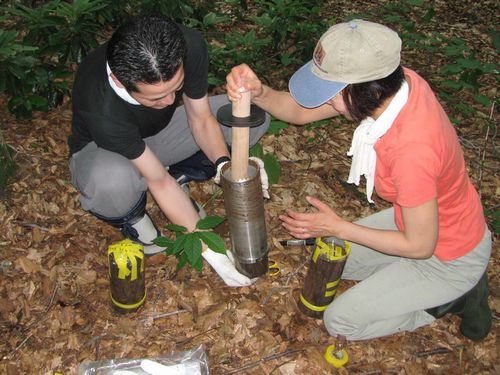March 12, 2009
Japanese Researchers Warn of Global Warming Impacts on Soil Carbon Storage
Keywords: Climate Change Environmental Technology University / Research institute

Soil Sampling : Copyright the Japan Atomic Energy Agency
A joint research group of the Japan Atomic Energy Agency (JAEA) and the Forestry and Forest Products Research Institute (FFPRI) announced on October 21, 2008, their findings that global warming may accelerate the loss of carbon from soil organic carbon (SOC). A fraction of SOC, which has a relatively long residence time and is not presently considered a primary source of carbon dioxide (CO2) release, could be a main source for the future, the group warns.The scientists began by measuring the isotope ratio of radiocarbon to SOC in the soil of a cool-temperate beech forest in Appi, Iwate Prefecture, and then estimated its carbon storage potential.
As soil stores several times as much carbon as the atmosphere or terrestrial plants, there has been concern that global warming will stimulate the microbial decomposition of SOC and increase CO2 release from soil, which would accelerate the warming effects. It has not yet been clearly determined, however, how soil would respond to rising temperature over a long period.
The group focused on the facts that SOC with mean residence times (MRTs) of several hundreds to thousands of years can be distinguished by the isotope ratio of naturally produced radiocarbon (from cosmic rays), and that SOC with MRTs of one to one hundred years can be distinguished by radiocarbon from nuclear bomb testing in the 1960s. After measuring the isotope ratio of SOC samples from the test area, they found that the soil of the cool-temperate beech forests is a mixture of organic matter complexes with various carbon storage potentials.
According to the estimated responses of the mixture of organic matter complexes to temperature change, globally warming temperatures may by the end of twenty-first century accelerate carbon loss from SOC with MRTs of several decades to 200 years, which constitutes about a half of SOC stocks, thereby significantly increasing CO2 emissions. It is expected that calculating the world's SOC stocks with MRTs of several decades to 200 years will enable more precise predictions of the magnitude and timing of SOC responses to future global warming.
- Forestry and Forest Products Research Institute (FFPRI) official website
http://ss.ffpri.affrc.go.jp/e_version/index-e.html
- Using radiocarbon to estimate potential impacts of warming on soil carbon storage
http://www.jaea.go.jp/english/news/p081120/
index.shtml
Posted: 2009/03/12 06:00:15 AM
Related
"JFS Newsletter"
Related
"Popular Articles"
- New Nano-Bubble Technology May Help Dissolve Sludge and Improve Water Quality
- Japanese Firm Begins Development of Tidal Power Generation System
- Small Hydropower Generation System Developed for Use in Seawater, Weight Cut by Half
- Constructed Wetland Facility Established by Japanese University Purifies Livestock Farming Drainage
- Toyota CRDL Succeeds in World's First Artificial Photosynthesis Using only Water and CO2


